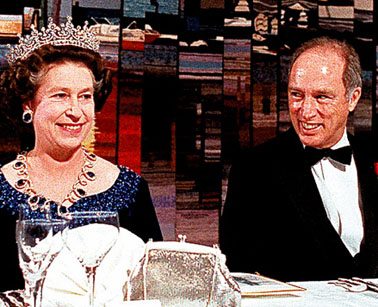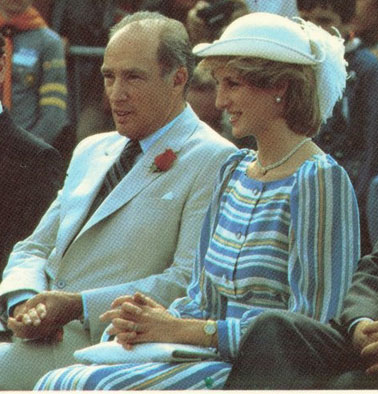Laughing to keep from crying in the Commonwealth realms : Justin Trudeau meets the Queen
Nov 25th, 2015 | By Randall White | Category: Canadian Republic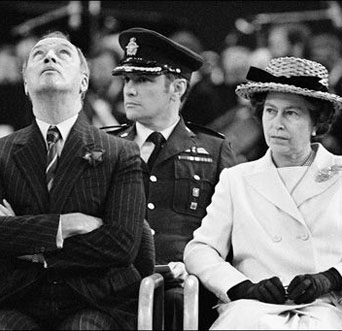
It is said today that Canadian Prime Minister Pierre Trudeau and Queen Elizabeth II finally got on very well. But life is complicated and this photo doesn’t quite seem a part of that story?
A few days ago on Canadian TV the always interesting Susan Riley in Ottawa was expressing her delight at the first few weeks of Prime Minister Justin Trudeau.
For a moment many of us shared her feelings. But then the otherwise excellent Ms Riley could think of no higher way of concluding her praise than to stress, with some apparent joy : “and next week he’s meeting the Queen” – or words to that effect.
Now next week has arrived. And not all we progressive Canadians who are happy enough about Justin Trudeau so far will share Susan Riley’s joy about going to London to meet the Queen.
On the other hand, who could seriously object to such a thing! And it has in fact already happened today, as I write. (See “Queen says it’s ‘extraordinary’ to meet her 2nd Prime Minister Trudeau” ; “Trudeau visits the Queen in London, recalls meeting her as a child.”)
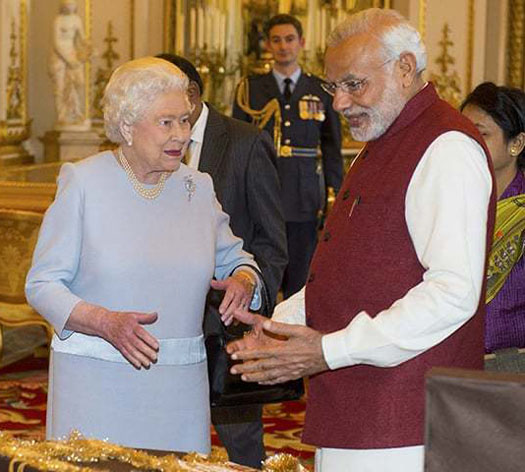
Queen Elizabeth II with Prime Minister Narendra Modi from India, on his recent visit to Buckingham Palace.
And why not? Our new Prime Minister Trudeau II is on his way to the biennial Commonwealth heads of government (CHOGM) meeting, in Malta this year.
This could be the last gathering in far-flung places of the global village attended by the Queen, who turns 90 in April, in her still extant role as Head of the Commonwealth.
(Where the Commonwealth today is a dazzlingly diverse fraternity/sorority of 53 independent countries around the world, the majority of which are republics not monarchies. And where about half the population of this diverse international organization in 2015 resides in India!)
Most surviving Canadian monarchical enthusiasts (who, just for the record, do not constitute a majority in contemporary Canada, by any poll conducted for a good number of years) at least ought to be pleased. Justin Trudeau is hip and progressive enough to choose a 50% female cabinet. But he is also still saying :
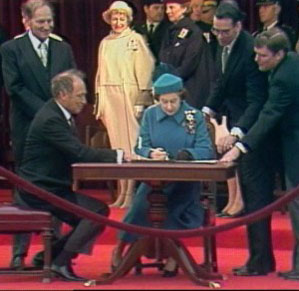
On April 17, 1982 Prime Minister Pierre Trudeau and Queen Elizabeth II signed the historic documents “patriating” Canada’s constitution from the United Kingdom --- and creating the Constitution Act, 1982, headed by the Canadian Charter of Rights and Freedoms.
“I am absolutely delighted that Her Majesty has graciously agreed to this meeting … As the Queen’s 12th Canadian prime minister, I am honoured and very much look forward to spending this time in conversation with her … In her role as Queen of Canada, she has not only witnessed but also been an active participant in the evolution of our country over the past 63 years. Her Majesty will remain an integral part of our country’s progress and future.”
Meanwhile, we progressive Canadian republicans of the 21st century were happier to read in the UK Daily Mail that “New premier Justin Trudeau’s Liberal Party is considering its position on the monarchy after formally debating republicanism in 2012 … Â A large portrait of the Queen has been removed from Ottawa’s Foreign Affairs building and they’ve put on hold the job of an official who deals with Buckingham Palace … Â Might HM’s image soon disappear from Canadian banknotes under plans to revise their currency?”
Back here in Canada, more or less reasonable monarchical enthusiasts like Susan Riley can reasonably point out that the UK Daily Mail is going a bit overboard (as usual?). Prime Minister Justin Trudeau has put it in writing that “Her Majesty will remain an integral part of our country’s progress and future.”
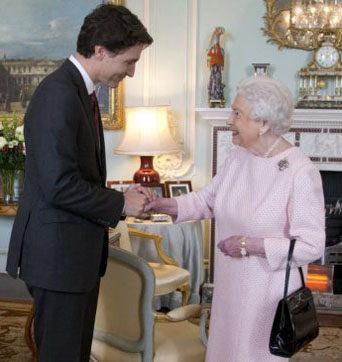 And yet we Canadian republicans can take heart from exactly what this says too – “Her Majesty will remain an integral part of our country’s progress and future” (my italics). Not the British monarchy. Not “And Her Heirs and Successors” or anything like that.
And yet we Canadian republicans can take heart from exactly what this says too – “Her Majesty will remain an integral part of our country’s progress and future” (my italics). Not the British monarchy. Not “And Her Heirs and Successors” or anything like that.
On TV a few days ago even Susan Riley acknowledged the other side of the argument here. “All this,” she finally concluded with a sly smile, “is just about the Queen.” (Or words to that effect.) “After that, all bets are off.”
And all this quite tidily summarizes the essential answer to a still wild and crazy question I was recently asked to investigate : “What is the state of the republican debate today in the 15 Commonwealth realms?” (Definitions available on request.)
For insomniacs thirsting for further details, I have taken a quick and dirty look at recent related developments in Jamaica, Barbados, New Zealand, and Australia. Then I’ve tried to say a little more about our situation in Canada today, in light of this wider background. If you feel your own bout of insomnia coming on, and want to fill out the more economical wisdom of Susan Riley, click on “Read the rest of this page” and/or scroll below.
Recent republican developments in the Commonwealth realms
(An earlier version of this material was prepared for the Annual General Meeting of Republic Now/République du Canada, at Metro Hall in Toronto on Saturday, November 21, 2015.)
As one logical place to start, note what the British monarchy website tells us about “Commonwealth realms” – the last stand, as it were, of the old imperial “doctrine of common allegiance” to the British Crown, among the 53 mostly republican members of the Commonwealth today.
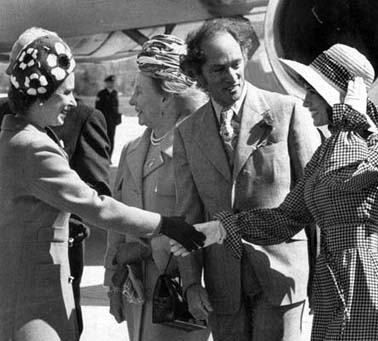
On a happier occasion, on June 9, 1971, Queen Elizabeth arrives at Vancouver Airport, and shakes hands with Margaret Trudeau while Prime Minister Pierre Trudeau stands by. Photograph by: George Diack, Vancouver Sun.
I quote directly : “A Commonwealth Realm is a country which has The Queen as its Monarch … There are 15 Commonwealth Realms in addition to the UK: Australia, New Zealand, Canada, Jamaica, Antigua and Barbuda, Belize, Papua New Guinea, St Christopher and Nevis, St Vincent and the Grenadines, Tuvalu, Barbados, Grenada, Solomon Islands, St Lucia and The Bahamas.”
In principle, as far as we Commonwealth republicans are concerned at any rate, all these 15 places will one day be (Westminster-style) parliamentary democratic republics – a constitutional status pioneered by India in 1949 and 1950, and Ireland in 1937 and 1949. There is already movement in this direction in at least four or five of the 15 realms, and that’s what the notes below discuss.
Before getting into specifics I want to say something general. I find my personal reaction to recent republican developments in the Commonwealth realms best summarized by the old African American adage about “Laughing to Keep from Crying.”
At the same time, we republicans are making progress, slowly but surely.
It won’t be easy. (In Canada, eg, the British monarchy nourishes a residual “Compact Tory” elitism in our political culture, that really does not want to give up without a very serious fight.) We are nonetheless destined to win in the end, because we are the only thing that finally makes sense in the 21st century …
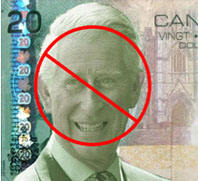 Note, eg, a September 2015 piece by the still rather young man Anthony Furey, in no less conservative (and Conservative) a place than the Postmedia Network  : “Monarchy will be hard sell after Queen Elizabeth … Stability. Tradition. Culture. History. These are all wonderful things, but it’s about time Canada embraced these values in a standalone fashion – rather than relying on the symbolism of a monarch from across the pond to bolster our pride.”
Note, eg, a September 2015 piece by the still rather young man Anthony Furey, in no less conservative (and Conservative) a place than the Postmedia Network  : “Monarchy will be hard sell after Queen Elizabeth … Stability. Tradition. Culture. History. These are all wonderful things, but it’s about time Canada embraced these values in a standalone fashion – rather than relying on the symbolism of a monarch from across the pond to bolster our pride.”
Mr. Furey goes on : “For better or worse, today’s young people are leading increasingly independent and purpose-driven lives. They don’t like answering to anyone … The idea of getting some sort of nationalist sense of self from a monarch, let alone a foreign one, just doesn’t make sense in today’s culture … It’ll be a hard sell to convince Canadians to willingly accept a new monarch once Elizabeth’s reign comes to an end.”
(1) JAMAICA
(a) A Saturday, September 12, 2015 editorial in the Jamaica Gleaner, on “The Monarchy And Beyond,” summarized the current state of the republican cause in this Caribbean island nation of some 2.8 million people (which also has so many connections with Canada today) :
“Former Prime Minister P.J. Patterson made a call in 2003 for the abolition of the monarchy by 2007. It didn’t happen. Taking up the call in 2010, Prime Minister Bruce Golding vowed to take steps ‘to amend the Constitution to replace the Queen with a Jamaican president who symbolises the unity of the nation’. It didn’t happen …
“Meantime, Prime Minister Portia Simpson Miller said in her inaugural address [January 5, 2012] … that completing Jamaica’s Independence ‘full circle’ would include replacing the constitutional monarchy with a republic … [See c. 22:05 on “Inaugural address of Prime Minister Portia Simpson Miller“] …
“Having made this declaration, however, only incremental steps have been achieved, such as the removal of the oath of allegiance to the Queen by parliamentarians. However, we continue to pay obeisance to the Queen. The courts of the land are conducted in the name of the Queen, and laws are passed in her name.”
(b) Just one day later, on Sunday, September 13, 2015, Â a related article appeared in the Jamaica Observer : “JUST A PROPOSAL : Hold a referendum on The Queen, CCJ with the next general election …
“We are not arguing the case either for or against the monarchy but we are simply suggesting that it is time to resolve this national debate which has dragged on for over 50 years …
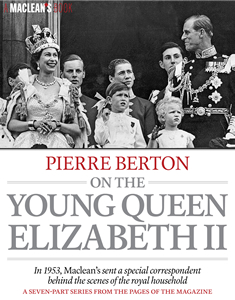 “In the case of the CCJ [Caribbean Court of Justice], we are yet to be convinced that the region is ready to make this far reaching decision which goes to the heart of our justice system. We will be happy to say ‘yes, let it go’, when we see that our politicians have matured to the extent that they can allow the CCJ to operate completely unfettered.”
“In the case of the CCJ [Caribbean Court of Justice], we are yet to be convinced that the region is ready to make this far reaching decision which goes to the heart of our justice system. We will be happy to say ‘yes, let it go’, when we see that our politicians have matured to the extent that they can allow the CCJ to operate completely unfettered.”
(c) The Caribbean Court of Justice is, as it were, equivalent to the Supreme Court of Canada – which became the final court of appeal in Canada in 1949.
Before that the final court of appeal in Canada had been the Judicical Committee of the Privy Council [JCPC] in the United Kingdom. And the JCPC is still the final court of appeal in Jamaica (as in seven other Commonwealth realms : Â Antigua and Barbuda, The Bahamas, Grenada, Saint Kitts and Nevis, Saint Lucia, Saint Vincent and the Grenadines, and Tuvalu”).
(d) Note as well : “In May 2015, the Jamaican House of Representatives approved with the necessary two-thirds majority bills to end legal appeals to the Judicial Committee of the Privy Council and make the Caribbean Court of Justice Jamaica’s final Court of Appeal.
“The reform will be debated by the Jamaican Senate,” where “the government will need the support of at least one opposition Senator for the measures to be approved by the required two-thirds majority.”
(2) BARBADOS
(a) On Monday, March 23, 2015 Carol Williams and David McFadden at The Associated Press reported “Barbados planning to replace Queen as titular head of state.”
The article went on : “Prime Minister Freundel Stuart announced that the plan is to make Barbados a republic by November 2016 when the island of roughly 300,000 people celebrates its 50th anniversary of independence. He said it makes no sense to keep the monarch as the head of state of an otherwise independent country …
“‘It’s a little awkward in the year 2015 to still have to stand up and instead of pledging allegiance to Barbados to be pledging allegiance to her majesty the queen,’ Stuart said during a late Sunday meeting of his ruling Democratic Labour Party…
“Barbados needs a two-thirds majority in Parliament to authorize the constitutional change. Stuart’s government currently has that majority in the senate, but not in the lower house. Opposition leader Mia Mottley did not immediately comment on Stuart’s plans …
“Barbados adopted the Caribbean Court of Justice as its final court of appeal in 2005, dumping the London-based Privy Council that long served as the court of last resort for many former colonies.”
(b) Three days later, on Thursday, March 26, 2015, the Jamaica Observer published a letter to the editor headlined “Retire the monarchy!”
It noted that “the Barbados prime minister has announced plans to remove The Queen as head of state and transform Barbados into a republic by November 2016 … Â The reasons are very similar to those expressed by Portia Simpson Miller back in 2012, when she also announced plans for Jamaica to replace The Queen with a ceremonial President.
“Years later, we haven’t heard a word from Simpson Miller about the transition, and understandably there might be other priorities … Â However, if little Barbados is able to do this, in the time frame given, this would really show up Jamaica.”
We do not yet know of course whether “little Barbados” will actually manage to do this by November 2016, about one year from now. (But see the example of republican achievement by the still more little Dominica in the appendix below!)
(3) NEW ZEALAND
Like Australia, New Zealand has had more serious interest in the republican issue among politicians than Canada (if not Jamaica and Barbados), without moving the republican cause  much further (if at all) ahead. But for Canadian republicans it remains a place to watch :
(a) The Wikpiedia entry “Republicanism in New Zealand” reports that “Keith Locke’s Head of State Referenda Bill for a referendum on the republic issue was drawn from the members’ ballot and introduced into Parliament on 14 October 2009.
“The Bill focused on reforming the Governor-General of New Zealand as a ceremonial head of state, creating a parliamentary republic. Two models of a republic along with the status quo would have been put to a referendum:
“Election of the head of state indirectly by a supermajority of Members of Parliament, similar to the bi-partisan appointment model proposed in Australia [in its failed republican referendum of 1999] ; Election of the head of state directly by the New Zealand electorate using the Single Transferable Vote electoral system, similar to Ireland …
“On 21 April 2010 the Bill was defeated at its first reading 53—68 with voting recorded as Ayes 53 being New Zealand Labour 43; Green Party 9; United Future 1 and Noes 68 being New Zealand National 58; ACT New Zealand 5; Maori Party 4; Progressive 1.”
(b) On Friday December 6, 2013 the New Zealand Herald published a piece called “Support for republic weak: report … Â Review panel finds little desire for changing constitutional status quo but says conversation should continue …”
The piece went on : “The panel looking at New Zealand’s constitutional arrangements says it did not find strong support for republicanism in the 120 meetings it held and 5259 written submissions it received …
“It said one grouping wanted a republican model and thought an elected president would better reflect democratic ideals.
“But another grouping suggested that under the system of constitutional monarchy with the Queen as Head of State, New Zealand has had a stable, well-functioning democracy.”
(c) On Monday, April 7, 2014 the Daily and Sunday Express in the United Kingdom asked “Could William and Kate effect quieten calls for republic of New Zealand?” …
Richard Palmer at the Express wrote that the so-called Duke and Duchess of Cambridge “have only been on New Zealand soil for a matter of hours, but already William, Kate and George have been hailed as restoring the fortunes of the British monarchy down under …
Mr. Palmer went on : “New Zealand Prime Minister John Key said while it is inevitable the country will eventually ditch the monarchy, that date will be put back because of interest in the Cambridges .” Prime Minister Key himself went on :
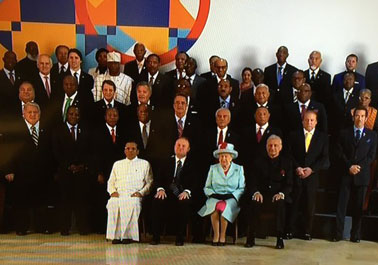
Commonwealth summit in Malta, November 2015. Official photo – somewhat truncated at ends to fit this space.
“Secondly, the Queen has recently celebrated 60 years on the throne. I think there’s just enormous respect for her role and the part that she’s played and her dedication.”
All this “comes against a new poll by Curia Market Research, commissioned by the New Zealand republican movement, which suggested support for the monarchy had fallen … Â It found 44 per cent wanted a New Zealand-born head of state compared to 40 per cent in previous polls in December 2012 and April 2013 … Â Those in the 18-30 bracket showed 66 per cent support for ditching the monarch. Overall, however, 46 per cent of New Zealanders favoured having the next British monarch as their head of state …”
(d) This past September 9, 2015, in the pages of  The Australian, Julia Hollingsworth of the Australian Associated Press (AAP) was noting that “Popular Queen delaying NZ republic move … Queen Elizabeth is so popular many Kiwis don’t want New Zealand to become independent until she’s off the throne, says a leading republican.”
The article went on : “‘For a lot of people, there’s a very strong emotional attachment to Queen Elizabeth because unless you’re over 80, most people won’t remember a time when she wasn’t the head of state,’ New Zealand Republic’s chairman Savage, who uses just one name, told AAP.”
(e) On November 16, 2015 the website for New Zealand Republic – the leading republican organization in the land of the Kiwi – was urging that a “majority of Kiwi men already support a NZ Head of State. We need more women to become active members.”
In Canada as well, in opinion polls and the turnout at activist meetings etc, there are more men than women who support the republican cause. And I at least can’t help but wonder : does the Queen attract feminist backing that it would be wrong for a future King to depend on?
(f) The great republican related action in New Zealand right now is a flag referendum — in pursuit of an objective that we achieved in Canada as long ago as 1965….
See, eg : “Voting has begun in New Zealand in a referendum which could see the country getting a new national flag … New Zealanders have just under a month to send in a postal ballot on which of five potential new flags they prefer … A second vote in 2016 will ask whether they want to replace the existing flag, which features the UK’s Union Jack, with the new design.”
And then, in pursuit of still more laughing to keep from crying, see “New Zealand Flag Referendum Begins, Opinion Poll Shows Citizens Might Stick To Existing Flag … The Flag Consideration Panel narrowed down the choices to five flags from among more than 10,000 entrants. Four designs feature the fern, the informal national emblem, while the fifth gained entry after a social media campaign for its inclusion.”
Why did we in Canada acquire our own flag in 1965 (as opposed to one with the Union Jack still in the top left hand corner), while Australia and New Zealand are still struggling with this part of what is broadly part of the same republican cause, so to speak? The shortest answer has to be Quebec or French Canada. And maybe that will finally make us the first of the current Commonwealth realms to become a republic too, even though more politicians are interested in the issue in Australia and New Zealand right now? (Well … after Barbados, say?)
(4) AUSTRALIA
Just remember that, in yet another effort to confuse the rest of us, the largest conservative party in Australia is called “Liberal.” Some might say it’s like BC in Canada, but, just for starters, Australia has no politician as cute as Christy Clark.
(a) On Monday, September 14, 2015 Australian prime minister and Liberal party leader Tony Abbott (ridiculously right wing) was ousted by Malcolm Turnbull (more moderately right wing ), after a 54—44 vote among Liberal party MPs and senators …. .
On the surface this was great news for Australian republicans. Malcolm Turnbull was the chairman of the Australian Republican Movement in the failed Australian republic referendum of 1999, and a key supporter of the republican cause down under. But …
(b) On Monday, September 21, 2015 the Associated Press published a report headlined by CBC News as “Malcolm Turnbull, new Australia PM, doesn’t plan to revisit monarchy … Turnbull once behind a failed referendum push to remove the Queen as head of state” …
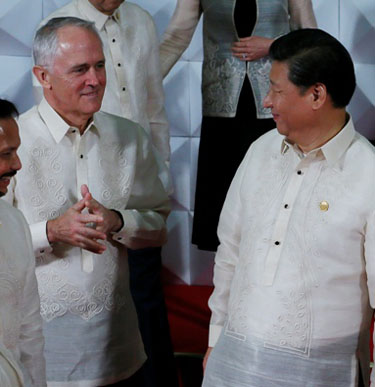
Chinese President Xi Jinping, right, talks with Australian Prime Minister Malcolm Turnbull following an official group photo prior to the welcome dinner at the Asia-Pacific Economic Cooperation (APEC) summit in Manila, Philippines. Wednesday, Nov. 18, 2015. AP/Bullit Marquez.
The report went on : “Many believe that with both the prime minister and opposition leader Bill Shorten now supporting an Australian republic, the constitutional change could now be possible. Opinion polls suggest that most Australians believe that they should have an Australian head of state … But Turnbull said there needed to be a ‘genuine popular movement’ for change …
“‘My own view … is that the next occasion for the republic referendum to come up is going to be after the end of the Queen’s reign,’ he said. ‘I think that will be the next watershed event, if you like, to make that issue relevant.’”
(c) On Sunday, October 6, The Age in Melbourne published a somewhat contrary opnion piece, arguing that “Malcolm Turnbull should make the republic debate a priority.”
The article was written by Lucas Grainger-Brown – “a writer and a student at the University of Melbourne” …
He urged : “The republic is integral to our cultural wellbeing. It is not an economic issue … Â If Turnbull wants his government to be seen as truly grappling with issues of the 21st century, he must prioritise our becoming a republic.”
Grainger-Brown went on : “Then he should commit to meaningful engagement with Indigenous people, to find out what forms of legal representation best support the shared values and culturally distinct identities that a cosmopolitan, self-constituted Australia should enshrine …”
(d) On Friday, October 16 The Telegraph in the United Kingdom published “Australia should abandon British monarchy and become a republic, says former PM Paul Keating.”
Paul Keating, Labor prime minister of Australia 1991—1996, is in many respects the godfather of the republican cause in Australia – and, it is sometimes said, Australia’s version of Justin Trudeau’s father, Pierre Trudeau, Liberal prime minister of Canada (ie left wing, more or less) 1968—1979, 1980—1984 …
In the first half of the 1990s Keating did the ground work for what finally became the Australian republic referendum of 1999 – and also gave Australia a citizenship oath that pledges loyalty to Australia and its people rather than the British monarch, in 1993.
Keating is now urging “new leader Malcolm Turnbull, a staunch republican, to abandon the British monarchy to ‘tell us better who we are’” … Meanwhile, a “poll by the Australian National University in April [2015] found 54 per cent of people supported a republic, down from 66 per cent in 1998” [the year before the republic referendum finally lost 55%—45% – to no small extent because many Australian republicans disagreed with the proposed “minimalist” method of selecting an independent Australian head of state] …
(e) On Sunday, November 1, 2015 the CBC News website in Canada posted a Thomson Reuterrs report under the headline “Malcolm Turnbull, Australia PM, undoes predecessor’s pro-monarchy honours system.”
The report explained how “Australia’s pro-republic Prime Minister Malcolm Turnbull on Monday scrapped knights and dames from the nation’s honours system, less than a year after a furor sparked by the award of a knighthood to Prince Philip, Queen Elizabeth’s husband.”
It went on :”Former Prime Minister Tony Abbott, a staunch monarchist, reintroduced the antiquated honours in 2014, provoking criticism that he was out of touch with public sentiment. Abbott was ousted by Turnbull in a party coup in September … The politically disastrous decision to give Prince Philip the nation’s highest honour, Knight of the Order of Australia, on Australia Day, has been cited as the beginning of the end for Abbott …
“The decision by Turnbull, a former head of the national republican movement, to scrap the honours may be interpreted as a signal of his willingness to revisit the thorny question of Australia’s relationship with the monarchy.”
(f) On Thursday, November 12, 2015 Peter FitzSimons, National Director of the Australian Republican Movement, sent a message to supporters headlined “Back on the front pages – where we belong.”
As Malcolm Turnbull greeted Prince Charles on a visit to Australia, FitzSimons reported : “An Australian republic is back on the front pages of newspapers and leading television and radio bulletins around the country.
“The ARM commissioned polling to coincide with the visit of Prince Charles and Camilla that indicates that just one in four Australians support a future King Charles reigning over Australia …Â Not only that, when King Charles is factored in, support for a republic climbs back over 50 per cent. This is territory the Movement has not traversed for some years and we intend to build on that majority support over the coming weeks and months.
“Yesterday was a big day for our Movement, and it was only possible thanks to your support. I really mean that. Five months ago, the ARM would not have had the funds to commission such a poll – the opportunity would have gone begging … e have had an extraordinary few months with membership growth of 130 percent since July … But there is much more to do.”
(5) CANADA
(a) Prime Minister Justin Trudeau had some further clarification on his government’s approach to the future of the British monarchy in Canada, at a press conference with British journalists after his visit with the Queen on November 25, 2015.
A report from the Ottawa Citizen covers the bases : “The prime minister was also asked whether, as in Australia, there’s much debate over the Queen’s role as head of state in Canada, and about his government’s decision, just days after taking power, to remove the Queen’s portrait from the Foreign Affairs building in Ottawa.
“The Liberal government replaced the Queen’s portrait with artwork of Quebec artist Alfred Pellan that once hung in the same spot, before the Conservatives removed it in 2011 in favour of a portrait of Her Majesty … Trudeau said there has been a long tradition of showcasing Canadian artists in Canada’s embassies around the world, and that there’s not much of a debate, like in Australia, over whether the Queen should be head of state …
“‘It was something that the previous government did I think as a sign of its disrespect towards the arts community’ … Â Trudeau said … ‘So it was more about restoring Canada’s place and not meant at all as a disrespect to our Queen who still adorns many, many bank notes … You’re right that there isn’t a huge appetite for that in Canada (for debating the Queen’s role as head of state). There are far more pressing things and we’re perfectly happy with our Queen of Canada.’”
(b) Again, we republicans can take some heart (maybe? hopefully?) from the new prime minister’s use of the phrase “Queen of Canada” here (without reference, eg, to her children and grandchildren).
Again, not the British monarchy or constitutional monarchy or anything like that. And note the related difference between what the Liberal and Conservative parties told the Monarchist League of Canada, when canvassed for the recent 2015 federal election.
For the Liberal Party the monarchy issue right now is apparently all about not wanting to offend “Queen Elizabeth II … the longest reigning monarch in Canadian history … Â a beloved figure for many Canadians … Her Majesty will remain an integral part of our country’s evolution, progress, and future.”
The Conservative Party, on the other hand, told the Monarchist League that “Canada’s system of government … is rooted in constitutional monarchy and the institution of the Canadian Crown … the unique institution of the Canadian Crown will continue to be a central feature of our parliamentary democracy.”
Oh, and what about the New Democrats, who remain an important part of Canadian politics, whatever else?
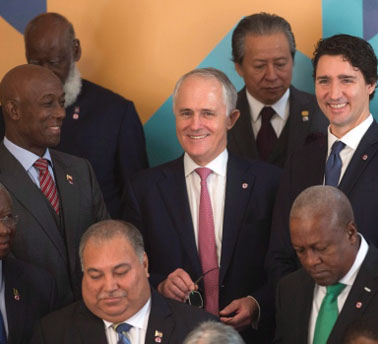
At the 2015 Commonwealth summit in Malta : middle row, l to r – Trinidad and Tobago Prime Minister Keith Rowley, Australian Prime Minister Malcolm Turnbull, and Canadian Prime Minister Justin Trudeau. Â They were apparently chatting, about something amusing, just before the official photo was taken. Adrian Wyld/The Canadian Press.
Their answer to the Monarchist League in the 2015 election campaign was quite succinct (and boring — which may have been part of the larger problem?) : “The NDP is not planning any changes to our current form of the parliamentary system. Our focus is on meeting the challenges of middle-class families for better jobs, affordable childcare and reliable healthcare.”
(c) A new wizard of oz connection? It may not be too far from some more or less workable truth to say that the new Canadian Liberal government’s ultimate strategic position on the republican issue has quite a lot in common with the position recently rather succinctly put by the new Australian Liberal prime minister, Malcolm Turnbull.
As explained by the Associated Press, not long after PM Turnbull took office : “Many believe that with both the prime minister and opposition leader Bill Shorten now supporting an Australian republic, the constitutional change could now be possible. Opinion polls suggest that most Australians believe that they should have an Australian head of state … But Turnbull said there needed to be a ‘genuine popular movement’ for change … ‘My own view … is that the next occasion for the republic referendum to come up is going to be after the end of the Queen’s reign … I think that will be the next watershed event, if you like, to make that issue relevant.’”
(d) On the matter of the “genuine popular movement” here, eg, note something Justin Trudeau also told the Monarchist League of Canada, when he was running for the federal Liberal leadership in 2013 : “My view is that severing our centuries-old connection to the monarchy is not a decision to be made lightly. The monarchy remains a cornerstone of Canada’s foundation, and any debate surrounding changes to this institution must include as many Canadians as possible in the discussion.”
(e) On the matter of the end of the Queen’s reign as the next republican watershed event, this would at least appear to be the light at the end of the Justin P.J. Trudeau tunnel for the 55% of Canadians who told the Harris Decima pollsters in 2013 that they “want change to Canadian head of state instead of continuing with any member of the British royal family … Only 34% want royal family member to continue to be Canada’s head of state.”
(f) Grass-roots challenges – No King Charles of Canada, etc. This kind of broad policy thinking at the commanding heights of our democratically elected governments also presents a clear challenge to we grass-roots Canadian republicans.
Especially if, unlike our politicians, we really do believe that finally affirming the democratic sovereignty of the Canadian people will do our “free and democratic society” in Canada today untold worlds of common good.
Somehow, we have to build a “genuine popular movement” if we want our politicians to listen. Support in opinion polls is not enough. (And even if it were, we will still need much more support of this sort than we have now to finally win!)
To conclude with a bow to the important occasion for which all these far-too-long notes were originally contemplated, the current No King Charles of Canada public transit advertising campaign being pushed by my colleagues at Republic Now || République du Canada is an excellent early step in the right direction …
Meanwhile, kudos to Craig Adolphe for his excellent November 17, 2015 article in THE MANITOBAN … THE OFFICIAL UNIVERSITY OF MANITOBA STUDENTS’ NEWSPAPER, entitled “Off With Our Head … It’s time to toss the Queen.”
The country is finally in the hands of the young. And the work of young men like Mr. Adolphe helps convince old men like me that they at least will finally do the right thing!
(6) APPENDIX : TWO COMMONWEALTH CARIBBEAN REPUBLICS TODAY – TRINIDAD AND DOMINICA
The written-out version of all this is far longer than I imagined – like so much else I do some will rightly say. And (like virtually all potential readers, if any have survived) I don’t have time to do more on another fascinating sidebar that arises in research this sort.
(Well … I have to have coffee with the resident goddess of the office here. Thankfully, any reader who has made it this far will no doubt agree, and has something much better to do as well.)
Very quickly, however, there are already two Commonwealth republics in the Caribbean – and they each have a number of particular interesting features : Trinidad & Tobago (1.3 million people) and Dominica (72,300 people).
Rather than just copy what Wikipedia articles say, I’ll just point interested parties to the articles for “President of Trinidad and Tobago” and “Dominica.”
I should very finally note that Canadian republicans in the Toronto region have another reason to take an interest in Trinidad & Tobago.
It is the homeland of the late Charles Roach, whose contributions to Canadian republican and much allied activity in his adopted homeland on the northwest shore of Lake Ontario (following an early higher education in Saskatchewan) are legendary, in the heroic annals of Canadian democracy today.
RW/21/24/25/26 November 2015.
